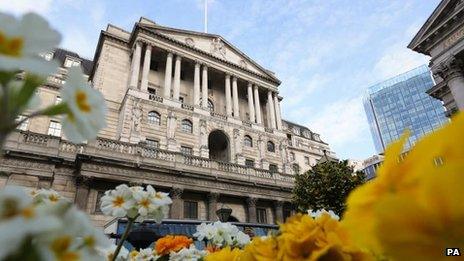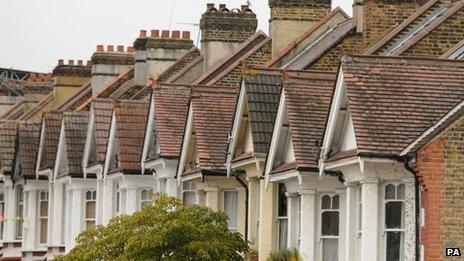Bank of England plans to win World Cup
- Published
- comments

The Bank of England's assessment of the health of the UK economy has not changed in any fundamental way over the past three months.
The Governor, Mark Carney, said the economy was only just beginning to get back to normal. And he then employed a perhaps unfortunate analogy with the looming World Cup, which was that the Bank's priority was to steer the economy through the opening rounds, all the way to victory.
Hmmm.
The auguries are, however, better than those for Roy Hodgson's crew.
It expects inflation to remain at or below the 2% target for up to three years, and growth in GDP or economic output this year of 3.4% (which is more optimistic than most forecasters, but is what it has been expecting for some months)
And the Bank is a little more optimistic about the pace at which unemployment will continue to fall, from 6.8% in the first three months of the year (as announced today): the Bank now expects unemployment to be 5.9% in the first three months of 2017, down from its previous prediction of 6.3%.
That benign outcome would be the consequence of a less benign one: the Bank of England has become a little less optimistic about the rate at which the UK's lacklustre productivity will recover.
There are two reasons why this expected delay in output per hours worked, or the efficiency of the economy, is potentially a bit of a pain.
It would postpone the widely longed-for recovery in living standards (pay rises are not inflationary when we are rewarded for working more efficiently).
And a worsening profile of productivity rises should in theory mean that there is less spare capacity or slack in the economy, which in turn would move the economy nearer to the moment when UK growth would become inflationary - and therefore closer to the moment when interest rates would need to rise.
But the Bank says that the decelerated recovery in productivity is not material, and that its estimate of the outstanding slack in the economy has not narrowed by very much (it estimates this slack as equivalent to between 1% and 1.5% of GDP, or economic output).
Also the 10% rise in the value of the pound over the past year has subdued inflationary pressures (because the price of imports falls).

The Bank has signalled unease at the rate of new mortgage lending
So, as I have mentioned, inflation does not look a scary prospect.
That in turn begs a resonant question: if the Bank expects to meet its mandated inflation target over the next two to three years, why do investors expect interest rates to start rising in the first quarter of next year?
Is the market wrong to anticipate an increase in the Bank's policy rate early in 2015 (it wouldn't be the first time)?
That is the implication certainly of the Bank's latest forecasts, since they are based on rates rising in the second quarter of 2015.
As for the UK's national obsession, house prices, the Bank signals unease that new mortgage lending is redolent of a bubble and potential financial instability - in that it says that "new lending at high loan to income ratios has surpassed pre-crisis levels, particularly for high-value properties, including those in London".
In other words, worryingly large numbers of people are taking out mortgages that are equivalent to a record multiple of their respective incomes.
When I asked the governor about how he would deal with this incipient bubble, he said in the first instance that would be an issue for the new Financial Policy Committee, which has a range of powers to rein in banks' ability to make riskier loans.
He was therefore signalling that the increase in house prices does not necessitate a rise in interest rates - so as and when a rise in interest rates does come, it will initially be prompted by concerns of general over-heating in the economy (which does not appear an imminent danger) rather than narrower over-heating in the housing market.